I pose a lot of questions in this title. IT certifications, do you have any? Perhaps you have none, perhaps you have 10, but does it really matter and what do they really prove?
23 years ago, two months after finishing high school I sat my first IT certification exam, and leading up to where I am today (Chief Architect @ Microsoft ANZ), I have covered on my journey hardware, networking, security, AI, multiple cloud vendors and industry-based frameworks (ITIL / TOGAF). But is certification the silver bullet in building a successful career in IT?
The short answer is no, but it’s not boolean and certification has played its part.
Having a dose of natural curiosity has been a major factor. My journey started at age 5, a 8088 XT based computer (CGA, no HDD, Low density FDD). A lot of what I did was issue the ‘type‘ command, author batch files, edit my config.sys/autoexec.bat to gain an understanding of this 8-bit machine. I was really just having a play, being curious before moving to BASIC and 40 years later I am still doing the same in principal.

But what part does IT certification play in an IT journey and should you get certified to get started in IT?
In this post I am going to break down
- How I Learn
- What I Like About Certification
- Show Not Tell – Labs And CLI’s – Cisco & Microsoft
- What I Don’t Like About Certification
- Why You Should Get Certified
- What If You Don’t Get Certified
- Braindumps
How I Learn
We all learn in different ways, but there are similarities. How I learn has changed in the 20+ years since I have left school and headed into IT.
Early on where my knowledge and experiences were low, IT certification gave me that baseline. The basics of DNS, the fundamentals of networking and so on, and there is indeed value. Between the age of 18 to 26 I obtained multiple CompTIA certifications, a MCSE and MCSA along with a CCNP.
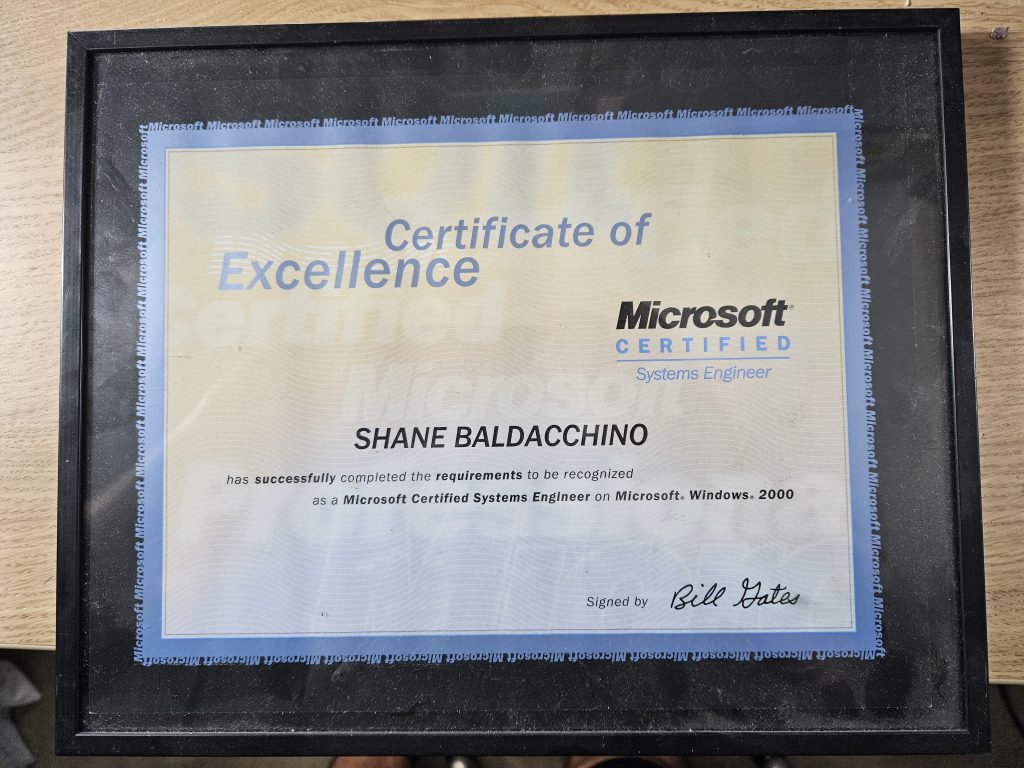
It was these certifications that set me up to be able to experiment. Writing ADSI code for IIS through to manipulating everything from Active Directory through to making my own crude forms of configuration management (before the likes of Ansible) and beyond.
As I write this post and reflect on the 25+ exams I have sat I realise I take exams often for two reasons.
- Firstly, I need to, simple as that. Perhaps you are seeking a new role and need specification certification. Certification is a gate you need to unlock.
- Secondly, it acts as a solid foundation before I go and choose my own adventure. I have spent time in both Microsoft and AWS cloud platforms, I have run my own business and the first thing in all 3 scenarios I have done is certify on the core technologies I am using day to do day.
- Bouns reason for vendor players. If you work for a vendor, it enables you to build empathy with your customers. Do you understand when you tell them to go and get certified what they are going through? Take the exams and even take the courses (if your organisation runs them), it’s about building and forging relationships. Walk in their shoes.
But how do I really learn? It’s by building. Since joining Microsoft in 2021 I have sat 11 exams from AI, through to networking, generic solution architecture and security and beyond. A solid taster. In the last week I was authoring code for a demo using our Python SDK against Azure Event Hubs. No exam is going to teach you this, it’s by building that you keep your saw sharp and really learn. Certification gave me a grounding early in my career, but it’s by building that you really get an appreciation and hone your skills as a fine crafts-person.
Using DNS as an example. I learnt about DNS only skin deep in my Windows 2000 MCSE journey, but only by running my own BIND servers manipulating configuration files, using dig, nslookup and Windows DNS in anger did I really understand SPF and how DNS holds everythig together.
Certification is a ticket to the dance. In the example above with Azure Event Hubs, it was certification that helped me instantly reaslise after reading through the Python SDK that I would need a Shared Access Policy and the relevant partitions. Certification today is my baseline knowledge.
As per the saying “You can’t put the horse before the cart”, certification is that horse.
But what if you don’t certify? If you are a reader of my posts (thank-you), you will see I like to dabble with microcontrollers and build electronic circuits. With no formal training my path to getting there has resulted in my early days of letting the smoke out of many IC‘s. Would a formal degree / course help me understand the difference between a BJT (Bipolar Junction Transistor) vs, a Mosfet? I have no doubts that it’s a yes.
What I Like About Certification
Certification differs from vendor to vendor and your mileage may vary but by and large there is value in IT certification. What works is the broadness that certifications cover. Most certifications I have studied for, from the basic ones such as Comptia A+, Azure and AWS Associate level through to expert certifications from Microsoft, Amazon and Cisco have study guides from a few hundred pages through to thousands of pages, or if you translate this to the online video world 5 to 20 hours of content.
It’s this depth and your investment of time that gives you a broad foundational set of knowledge that is going to at the very least teach you something (you may or may not use it).
But these days, would you believe I don’t study for exams (unless I need to). As technology is evolving, so are certifications and of late I am hearted by many of the newer Microsoft exams that include hands on labs. Rather than asking a question deep in the semantics on how to manipulate a route table or a NSG (Network Security Group), it’s my opportunity to show not tell. With the advance of GAI (Generative AI), these rote learning tasks are far becoming a thing of the past. I may not know the exact order to perform a task but given time and if you have that broad knowledge, you can figure this out.
Show Not Tell – Labs And CLI’s – Cisco & Microsoft
In having sat north of 25+ exams, failing a few along the way there is one vendor that I hold their certifications in highest regard. It’s not Microsoft, it’s not Amazon Web Services, it is Cisco. I failed my fair share of Cisco exams and it’s because they are closer to real life than any exam I have sat from other vendors.
You live in the terminal, need to drive Cisco IOS/NX-OS or a simulated lab, and it speaks to why I often see so many people trying to sell 1/4 racks of networking gear that they used to prep for a Cisco certification (Australian eBay search). I eventually folded and bought my own Cisco Catalyst equipment to pass my exams.

Today this practice still continues and speaks to why on we see not only listings online for equipment but far less online material from Pluralsight (and others) for Cisco versus vendors like Microsoft. These are hard exams (I found them hard) if you aren’t on the tools. I failed 3 Cisco exams on my way to a CCNP, and the coupled with the fact, as soon as you get to a point where you can’t pass the exam the exam ends means you can’t even attempt to remember what you got asked adds another dimension. This gave me not only an appreciation for those who pass (CCNP / CCIE hats off to you) but a healthy dollop of respect in the tough love stance Cisco has, which leads to their certifications carrying weight in market.
Kudos to both Microsoft and Cisco for leveraging more labs, more simulated content than your traditional multiple choice, by doing so this increases the true value of certification.
What I Don’t Like About Certification
The true value of certification. Is it valuable when these exams are quite easy to pass or easy to cheat? To maintain a balanced viewpoint there are many reasons where certification falls over where you can certainly question the value in certification. Here are a few reasons.
- Braindumps – Firstly don’t do it, it proves no point but how many people have you met who are certified yet know very little about the subject area? I have met my fair share. At the end of the day, you are just cheating yourself and devaluing the process. More labs, and dynamic content are fast disrupting the business model of these shaky operators.
- Vendor specific – you just obtained that expert level certification, but if it leans heavily on a vendor’s product rather than a technology that is more ubiquitous in the industry, are you an expert? I would question if a security expert that doesn’t know OWASP topics like CSRF (Cross Site Request Forgery) inside out or an AI(Artificial Intelligence) expert that makes does not know Scikit Learn, TensorFlow or Pytorch is really an expert, or are they someone who knows a specific vendors technology?
- Rote Learning – My biggest bug bear. How many questions have you been asked that you could put into your favourite search engine in the real world. Example “Name the correct SKU to perform this function” or “What are the 5 steps in order you to perform to achieve an outcome”.
In 2023, the above is not of value, the above dilutes the value vendors strive to place in certifications. If you are reading this, and you help drive the content of exams, I ask you leverage more dynamic, less vendor specific outcomes in your exams and above all less on static learning.
Why You Should Get Certified
In taking all of the above into consideration, on balance, certification is worth it. To the point not only am I endorsing this and continue to certify, but I am working through with my 13-year son through foundational level cloud computing certification to compliment his Python courses (double thumbs up to Grok Learning). Why, because I truly believes certification gives you foundational knowledge even if it is heavily skewed in a specific vendor. The premise between Azure Functions, AWS Lambda and Google Cloud Functions are fundamentally the same, and hence there is learning to be had in taking a vendor certification that often extend outside the given platform.
As an example, many of the more basic (Associate level) Microsoft certifications I take without study, I leverage my experience in other vendors, because functionally they are at their core the same, with the differences being around the edges.
What If You Don’t Get Certified?
Today many of the most intimidating conversations I have had are with builders with no certifications (what gives). These are builders at heart who live on the tools, it’s their experience that sets them apart. It’s okay to not be certified, but you need a mechanism to learn, to be hands on. You may not have that foundation, but you will soon acquire one, and before you know it, significantly deeper than if you were to just certify and stop (I have forgotten most of what I have learnt in my Cisco certifications).
Not to embarrass a friend, but a prime example of this path is James Matson, he is the builder persona who shows, not tells and is able to go far and wide, not from certification but from continuously honing his skills and building. Here is one of my favourite articles James has authored, in this example he is leveraging Azure DevOps, GPT and PowerBi to increase developer productivity. This is the end-game you should strive to achieve.
Passing An Exam
So, you have decided you want to take that exam, congratulations. No what, how do you pass?
Depending on your budget there are various methods, and, in many cases, there is relationship between cost ($) and time.
Free : Vendor specific learning paths, YouTube & Microsoft Learn.
With each day that passes, this approach seems to be getting better and better. From John Savill and Tech With Lucy to many other channels on YouTube, there is thousands of hours to consume, and when I say thousands of hours, it’s thousands of hours often for just one exam. This can be hit and miss and your mileage may vary on the quality and usefulness of these videos.

If your world is Microsoft certifications, one platform that has seen significant investment in the last 12 months has been Microsoft Learn, to the point where for me, its actually better in terms of my time than ACloudGuru. Short, sharp and to the point. Most courses will take 3-5 hours (depending on the exam) with real labs that you can take without credits. Bravo Microsoft here. I can’t sing its praises enough. I am really impressed.
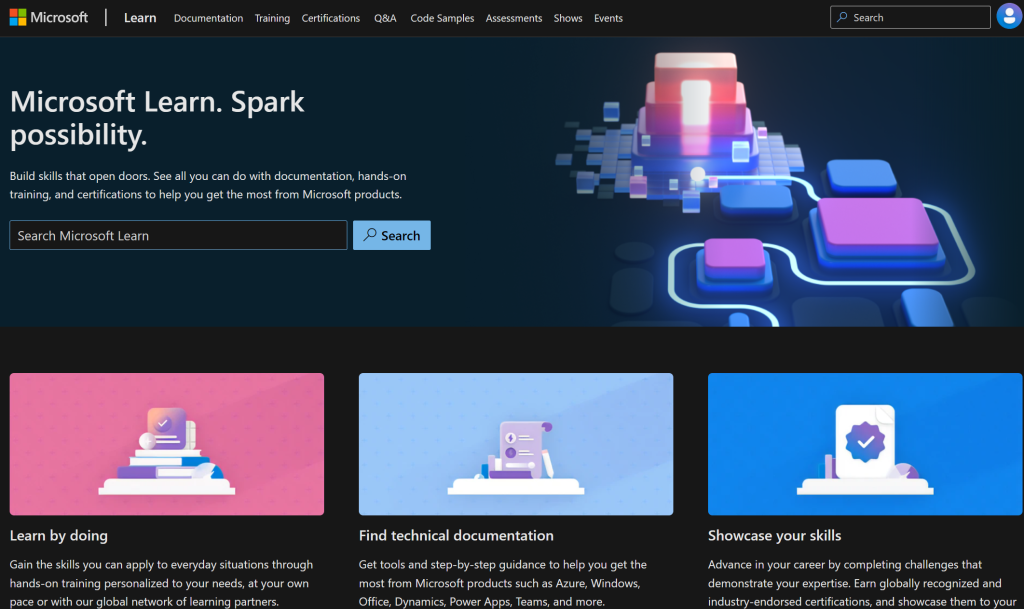
Books : Are you a book person? Be it a Mobi based Kindle version or a physical book, these can be a great way to reach the learning objectives. I find the most accurate versions are here are from the vendor (Microsoft Press etc) vs third parties. I have been burnt a few times. What books lack is that ability to invoke a lab and be hands on, but they can be a great companion if you are trying to learn whilst on a break or in a passive mode.
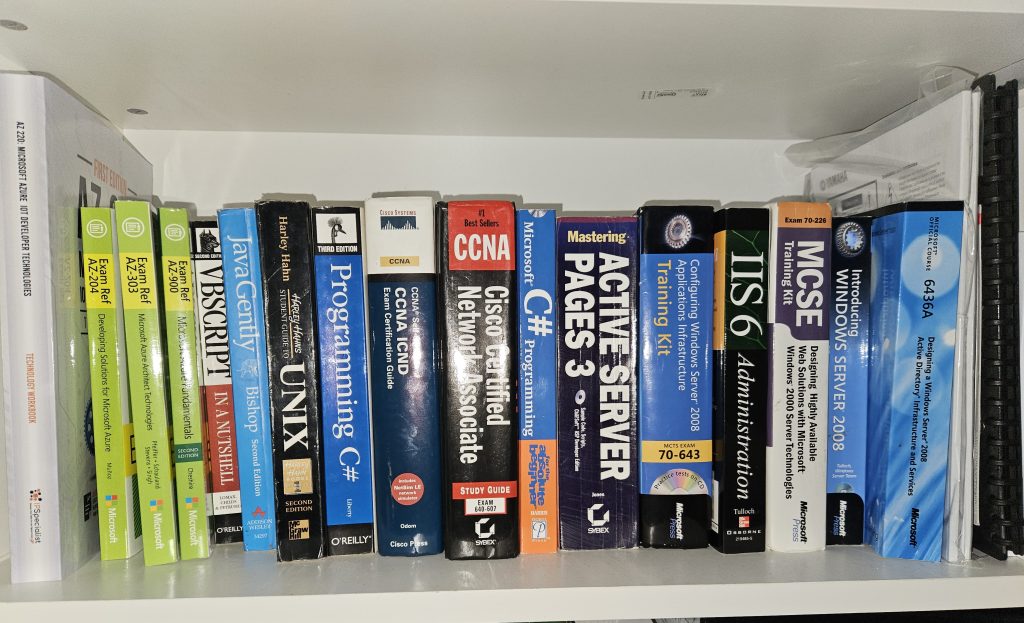
Online Training: AcloudGuru/Pluralsight/Any Other Platform
This new medium hits the sweet spot between classroom training (see below), YouTube and books. It has un-earthed stars like Melbourne’s own Lars Klint and for $35US per month(March 2023) on ACG (AcloudGuru), there is an all you can eat buffet of certification content.
Having been a user of ACG, Linux Academy and Pluralsight (who recently bought ACG), if your desire is cloud-based certification, ACG is the gold standard. It has a Netflix style interface that allows you to download content offline, a forum to converse and labs to test your skills. From sitting on the train, to the trainer its very convenient.
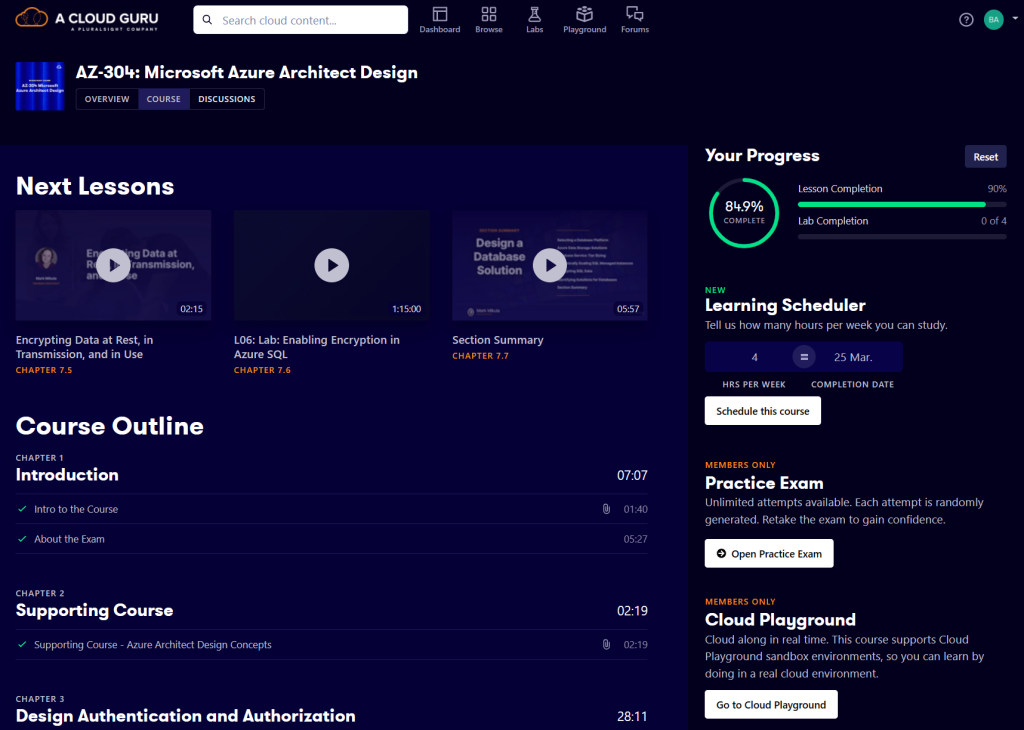
In Person Instructor Led : Here we have official courseware (often closely related to the vendor books) delivered by either by the vendor, or a third party authorised to do so. The instructor has usually delivered these courses countless times and will be able to answer any question you may have with poise.
Typically hosted over 3 full days to a week, these classes may cost more than $7,500AUD per student and are your fast track to passing that exam. I started with this after I left school, but soon realised that if I am motivated, I can pass an exam at a lot less cost, but it will take time. Think of this approach as your ‘turbo’ button to certification. From NetApp to Cisco, Amazon to Microsoft, this is big business. It is your fast track to certification. Less popular than when I started and unless you live in a major capital city, access to these courses may be limited.
If you choose to sit any such course, my recommendation is to extract maximum value and buy a book and read it end-2-end beforehand, otherwise you may end up spending a lot of money and may struggle to follow along. You want to walk into these courses with a before hand already with a solid foundation of the learning path.
But just as Netflix has displaced BlockBuster, today’s online platforms have significantly impacted this area. I live in Melbourne, Australia and where I used to attend such courses no longer offers training courses, the market has shifted.
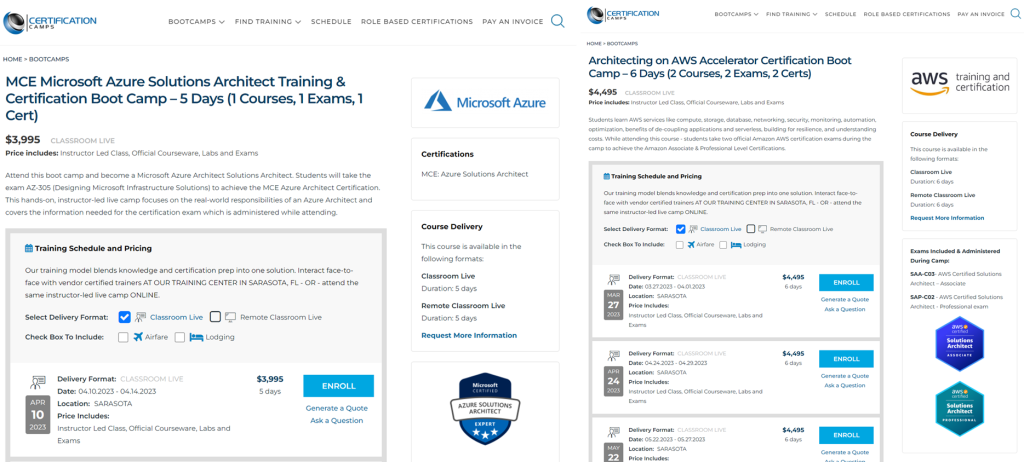
Braindumps
A quick word on Briandumps. I don’t want to spend too much time and give them oxygen, but we do need to talk about them. When you take any exam, you receive x questions from a pool of y. x could be 60 and y could 1000. Firstly, how many questions will you need to memorise and secondly as exams are becoming more dynamic and smarter with more labs, consoles and so on, this is a fools-errand and a has diminishing returns. Learn the content instead, it will make you a fare more valuable individual.
It not only proves nothing, but modern exam engines will hone in and ask you more questions on areas they believe you are weak on. I have sat exams on broad subjects, and have finished the exam thinking this was the Microsoft SQL exam when I sat a generic architecture exam or a BGP exam when I sat a wider networking exam (often my weak spots).
Even if you pass with a Braindump, you will soon be found out. In a past life, I ran a business and hired individuals with countless certifications, more than what I had at the time (MCSE, MCSA, MCP, A+) and within little to no time we realised that these individuals had no base knowledge, no grounding in what you would expect that they should have achieved from certification. So, what did it really prove? My hope is, just like we tackled and beat SPAM with technologies like DKIM, SPF, RTBL’s and Bayesian filters, that our exams will evolve to a point where the effort and cost (remember they are a business, a shady one at best) of using Braindump outweighs the value they provide.
Summary
Certify or don’t certify, the choice is up to you. The important thing is you are doing something, with every day that passes exams are becoming more and more dynamic and more realistic of real-world conditions, that’s great but they are still far from perfect.
When I am assessing candidates in job interviews, I am more impressed to hear about something you have built (Show me your GitHub repository), versus the plethora of certifications you have and that is sadly because many of these certifications don’t really illustrate your depth and experience. Again they provide a foundation, that you need to build from.
So, what’s my advice to you. It is actually to certify, but don’t stop there. Certification is a valuable feather in your cap of skills but without building upon this foundation it is not going to land you that next role (perhaps entry level). Use it as a base and go from there, otherwise you will have a CCNP (like I do) and often have to hit my favourite search engine whenever I am doing something moderately complex.
Thanks
Shane Baldacchino
P.S. What am I certified in? Check out my certifications – https://www.linkedin.com/in/shanebaldacchino/details/certifications/

This article hits the nail on the head! IT certifications are a game-changer in today’s job market. They showcase your skills and commitment to potential employers, making you a more attractive candidate. Whether you’re fresh out of school or a seasoned professional, there’s a cert path for you.
The article wisely points out how certifications build upon each other. Starting with a foundation like CompTIA A+ equips you with the essentials of IT, and then you can specialize with certifications like Security+ or CCNA. This targeted approach demonstrates your expertise in specific areas.
But nailing the exam can feel daunting. Here’s a pro tip for the “How Do You Pass?” section: Don’t underestimate the power of practice tests! Supplementing your studies with resources like Pass4SureHub (https://www.pass4surehub.com/) can be a lifesaver. They offer practice exams that mimic the real deal, helping you identify knowledge gaps and areas needing extra focus.
Think of certifications as stepping stones in your IT career. They validate your skills and open doors to new opportunities. With the right preparation and resources like Pass4SureHub, you can confidently conquer those exams and land your dream IT job!